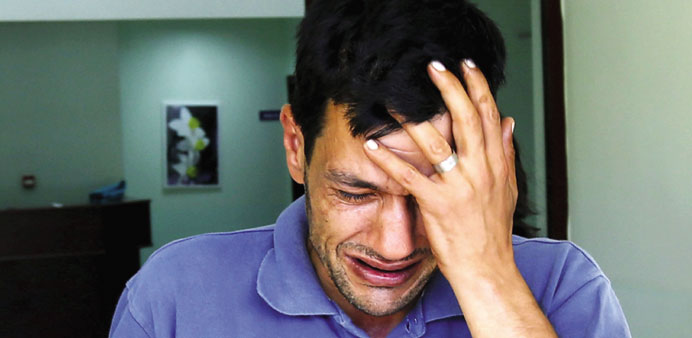Abdullah Kurdi, father of three-year old Aylan Kurdi, cries as he leaves a morgue in Mugla, Turkey, yesterday.
AFP/Amman
Syrian refugee Abu al-Yaman said that when he saw the photo of little Aylan lying face down on a Turkish beach, “I hugged my daughter tightly, imagining she could have been that innocent child.”
Like millions of others, Yaman was riveted by the image of the toddler, who drowned along with his mother and brother when their boat capsized on a short run from Turkey to the Greek island of Kos and hopes of a new life in Europe.
Umm Hussein, a 40-something mother who fled Syria’s war in the central city of Homs to a poor neighbourhood of the Jordanian capital, said the photo was too much for her.
“We witnessed the bombing, the destruction... but I couldn’t cope with the picture of that innocent child, whose only fault was to have been born in Syria,” she said, tears welling up in her eyes.
Umm Hussein said she can’t afford to send her children to school.
Syria’s civil war broke out four and a half years ago when President Bashar al-Assad brutally cracked down on peaceful protests against him and people took up arms.
It has claimed more than 240,000 lives and driven nearly half of Syria’s people from their homes. Some 4mn people have fled abroad, primarily to neighbouring Jordan, Lebanon and Turkey.
Jordan has taken in at least 600,000 of them, according to the UN, but the government in Amman says the figure is 1.4mn.
Nearly 80,000 of them have taken shelter at Zaatari, a sprawling desert camp in northern Jordan where Abu al-Yaman is the spokesman for refugees, and their plight has also left him furious.
He denounces what he calls the “treason of the world, particularly of Arab countries,” whom he also accuses of a closed-door policy.
He also accuses unnamed news media of “using the photo (of Aylan) in an exaggerated and negative way, as if their aim is to frighten Syrians and dissuade them from emigrating.”
And despite the risks, he doesn’t rule out heading for Europe himself.
“There is no other way out for Syrians but to emigrate, even if it means death,” he said.
The conversation returns to the image of Aylan, which Yaman said is “distressing for every human being who sees it”.
Abu Malek, a 30-year-old teacher living in Zaatari, said: “I never imagined that things would reach the point where one saw Syrian bodies lying on a beach or floating in the sea.”
Louei, 19, also deplores the sense of being “abandoned” by Arab countries.
“This image will haunt those countries forever,” he prophesied.

